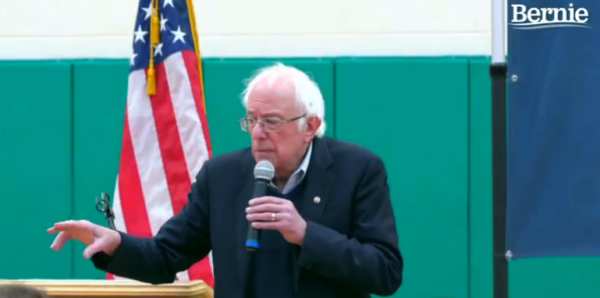
- Details
- By Levi Rickert
MESKWAKI SETTLEMENT, Iowa — Senator Bernie Sanders brought his presidential campaign to the Meskwaki Settlement, the home of the Meskwaki Nation (Sac & Fox Tribe of the Mississippi), the only federally recognized tribe in Iowa, on Thursday afternoon. Sanders was touring the state on Thursday in a campaign bus, one month before the 2020 Iowa Democratic caucuses on February 3, 2020.
Sanders told the tribal Meskwaki tribal citizens he is running for president for two main reasons: To defeat Donald Trump and make an economy that can be enjoyed by all--not only wealthy people.
"It is absolutely imperative we defeat Donald Trump, the most dangerous presin in the modern era of this country," said Sanders.
"We need to transform our economy that works for all, not just rich people. Millionaires and billionaires are doing quite well, while ordinary people are working two to three jobs," Sander continued.
He spoke about the living conditions of Native Americans.
"Native Americans have a lower life expectancy than others. The poverty rate for Native Americans is much higher than the average," Sanders commented.
"Here is a promise that comes from my heart, for much too long, the Native Americans have been lied to, treaties have been broken...as president, we will not be informing Native Americans about what is happening, they will be part of the decision-making procerss, Sanders promised.
After his short comments, Sanders participated in a panel of Meskwaki tribal citizens during the townhall. Watch the video below to see the campaign visit:
More Stories Like This
Native News Weekly (August 25, 2024): D.C. BriefsNavajo Nation Mourns the Passing of Former Vice President Rex Lee Jim
Deb Haaland Earns Endorsement From Communications Workers of America Local 7076
University Soccer Standout Leads by Example
Two Native Americans Named to Democratic Congressional Campaign Committee's“Red to Blue” Program
Help us defend tribal sovereignty.
At Native News Online, our mission is rooted in telling the stories that strengthen sovereignty and uplift Indigenous voices — not just at year’s end, but every single day.
Because of your generosity last year, we were able to keep our reporters on the ground in tribal communities, at national gatherings and in the halls of Congress — covering the issues that matter most to Indian Country: sovereignty, culture, education, health and economic opportunity.
That support sustained us through a tough year in 2025. Now, as we look to the year ahead, we need your help right now to ensure warrior journalism remains strong — reporting that defends tribal sovereignty, amplifies Native truth, and holds power accountable.
 The stakes couldn't be higher. Your support keeps Native voices heard, Native stories told and Native sovereignty defended.
The stakes couldn't be higher. Your support keeps Native voices heard, Native stories told and Native sovereignty defended.
Stand with Warrior Journalism today.
Levi Rickert (Potawatomi), Editor & Publisher

